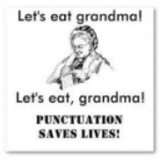No Commoners Here
My all-time favorite cartoon appeared in The New Yorker a few decades ago. A woman in a long formal gown and elbow-length gloves is at a posh party, brandishing one of those long-stemmed cigarette holders common among aristocrats in the day, her face sour with hauteur. Next to her is a tuxedoed gent, hands clasped behind his back, gazing imperiously at nothing. “Tell me,” says the lady, her expression unchanging, “what do you think of the comma?”
Comma-kaze
Not the most profound subject for cocktail discussion. But as a slam against snooty pretentiousness, the remark packed a deliciously satirical wallot. Nonetheless, the comma often plays an important role in shaping the meaning of a sentence. Newspapers show flagrant disregard for the comma in police-story attributions. Here is an example in the world news section of a recent issue of the Palm Beach Post. It apparently was a wire service item: “Actor Michael Jace … was arrested Tuesday after authorities said he called 911 and told an operator he shot his wife.” Here’s what the sentence says: Authorities said Jace called 911, and after authorities made that assertion about Jace, he was arrested. It’s highly doubtful that’s what the reporter who wrote the sentence meant to convey. The intended meaning quite likely was that authorities said Jace was arrested after he called 911 with the news that he had plugged his wife with a bullet.
Comma sense
Any confusion could have been eliminated the with the simple insertion of two commas: “Actor Michael Jace … was arrested Tuesday after, authorities said, he called 911 and told an operator he shot his wife.” One imagines that the dude in the cartoon, in response to the lady’s solicitation of his opinion of the comma, might have replied: “I think it can be pretty damned important.” He might have just read a newspaper police story about some actor shooting his wife. Gig Young, maybe? Yes, the cartoon might have appeared as far back as 1978. Of course, I was pretty damned young then. Ahem.

